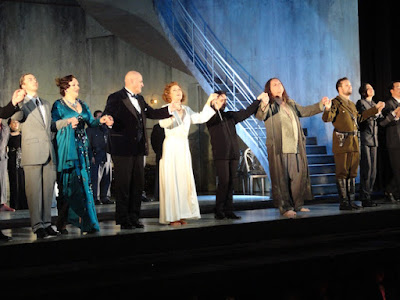(review in English below)
A Royal Opera
House voltou a levar à cena a Salome
de Richard Strauss na produção
polémica e ousada de David McVicar.
A acção é
transportada para o Séc. XX e decorre no palácio de Herodes. No primeiro andar
vê-se mal um jantar elegante, à luz de velas, mas com mulheres despidas e
entreter os convidados. O cenário principal é a cave imunda do palácio, com
paredes com azulejos brancos muito sujos, a condizer com tudo o resto. Os
militares abusam de criadas nuas. O profeta João Baptista (Jokanaan) está preso
numa cisterna, donde é retirado por algum tempo, a pedido da Salomé. Com o
decorrer da acção, todos descem para a cave.
As doentias cenas
de assédio e violência sexual da Salomé sobre Jokanaan e de Herodes sobre
Salomé são muito explícitas. A alusão à pedofilia surge na dança dos sete véus
que é uma recordação de sete episódios traumáticos passados entre a Salomé e o
padrasto (Herodes), em sete salas que vão surgindo sucessivamente pelo palco,
numa solução muito eficaz. A cena final de necrofilia em que a Salomé acaricia
e beija a cabeça do Jokanaan totalmente ensanguentada (trazida a escorrer
sangue por um carrasco também nu) é ainda mais impressionante. Uma encenação
bem conseguida, feita para chocar, que atinge plenamente esse objectivo.
O maestro Henrik
Nánási dirigiu de forma exemplar a Orquestra da Royal Opera House, que nos
ofereceu uma interpretação exemplar da magistral partitura de Strauss.
Os cantores
solistas foram todos excelentes. A soprano sueca Malin Byström foi uma Salomé de voz cheia e timbre suave e muito
bonito, mantendo elevada qualidade vocal ao longo de toda a récita, sempre
sobre a orquestra, mas com um final arrepiante. A cantora é magra, alta e
aparenta a juventude que a personagem exige, o que ajudou muito a sua óptima
interpretação cénica.
O barítono alemão
Michael Volle fez um Jokanaan
fabuloso, exibindo todo o esplendor da sua voz grave e poderosa, com um
desempenho cénico irrepreensível.
Herodes foi
interpretado pelo tenor inglês John
Daszak que nunca tinha ouvido e que esteve também num nível superior. Sem
exageros na interpretação, foi muito credível e sempre claramente audível.
A mezzo alemã Michaela Schuster, também com uma voz
penetrante e imponente, foi uma Herodias repugnante no encorajamento da filha a
pedir a cabeça do João Baptista.
O Narraboth do
tenor David Butt Philip foi afinado
e incisivo, apesar de ter um papel curto.
Os cantores secundários também não
destoaram, mas a noite foi da orquestra, dos solistas principais e, claro, do
público que teve o privilégio de assistir a um espectáculo de excepção.
*****
SALOME,
Royal Opera House, London, January 2018
A revival
of David McVicar's controversial and
daring production of Richard Strauss'
Salome was on stage at The Royal Opera House.
The action
is set at the 20th century and takes place in the palace of Herod. On the first
floor we can barely see an elegant candlelight dinner, but with naked women entertaining
the guests. The main setting is the palace's filthy cellar, with walls with
very dirty white tiles, to match everything else. The military men abuse naked
maids. The prophet John the Baptist (Jokanaan) is trapped in a cistern, from where
he is withdrawn for some time at the request of Salome. As the action
progresses, everyone descends to the cellar.
Sickly
scenes of sexual harassment and violence of Salome over Jokanaan and of Herod
over Salome are very explicit. The allusion to paedophilia appears in the dance
of the seven veils which is a reminder of seven traumatic episodes between
Salome and her stepfather (Herod), in seven rooms that appear successively on
stage in a very effective staging arrangement. The final scene of necrophilia
in which Salome caresses and kisses the completely bloody head of the Jokanaan
(brought by an also naked hangman) is even more impressive. A good staging,
made to shock, that fully achieves this goal.
Maestro Henrik Nánási conducted the Royal Opera
House Orchestra in an exemplary manner, which offered us an excellent
performance of Strauss' masterful score.
The soloist
singers were all excellent. Swedish soprano Malin Byström was a full-featured Salomé with a soft and very
beautiful tone, maintaining top vocal quality throughout the whole performance,
always heard over the orchestra, but with a fantastic final. The singer is
lean, tall and looks like the youth that the character demands, which greatly
helped her optimal scenic interpretation.
German
baritone Michael Volle was a
fabulous Jokanaan, exhibiting all the splendor of his powerful voice, with an
irreproachable staging performance.
Herod was
interpreted by English tenor John Daszak
whom I had never heard. He was also at a top level. Without overdoing the
interpretation, he was very credible and always clearly audible.
German
mezzo Michaela Schuster, also with a
penetrating and imposing voice, was a disgusting Herodias in her daughter's
encouragement to ask for the head of John the Baptist.
Narraboth
of tenor David Butt Philip was tuned
and incisive, despite having a short paper. The singers of the supporting roles
did not disappoint, but the evening belonged to the orchestra, the main
soloists and, of course, the audience who had the privilege of attending an
exceptional performance.
*****



















Sem comentários:
Enviar um comentário